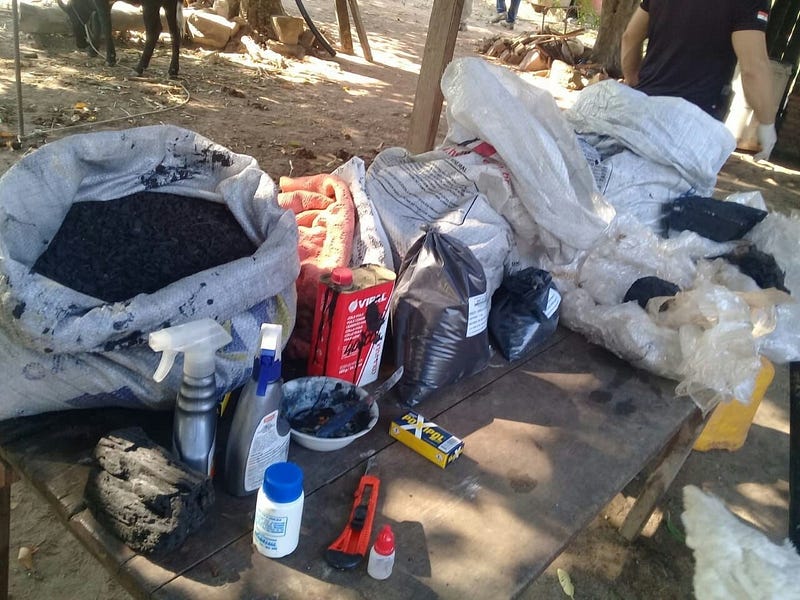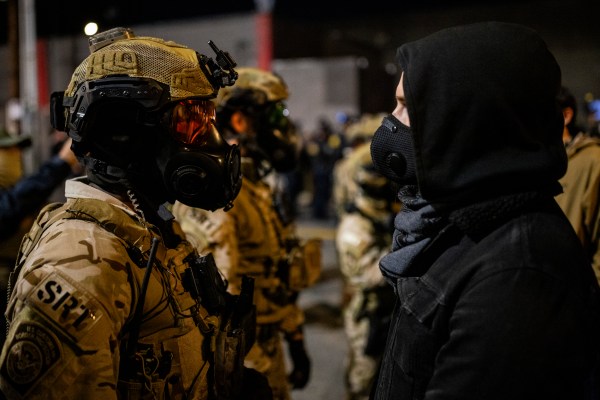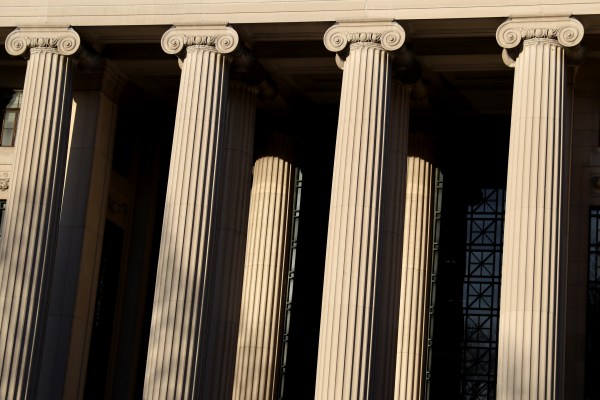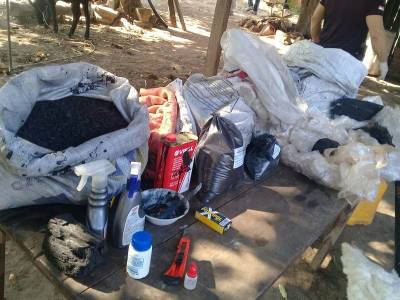Last month, Dutch authorities raided a lab in a small village where Colombian cartels turned charcoal-camouflaged cocaine briquettes back into drugs. The charcoal that most Americans burn in their barbecues is not the stuff they would normally associate with organized crime, yet evidence is mounting that in recent years charcoal—a key Latin American and African export—is fast becoming a cover to masquerade cocaine. In particular, the Lebanese terrorist group Hezbollah’s involvement in moving black cocaine—a term referring to this particular disguise—is well-documented. The global charcoal trade constitutes an ideal cover for drug smuggling and terror finance.
Drug traffickers constantly devise new ways to conceal drugs. Black cocaine—the compound used to turn cocaine into charcoal briquettes—needs to undergo a chemical process in order to appear similar to the actual product, before traffickers hide it at random in larger bags of authentic charcoal. Sometimes cocaine is hidden inside large chunks of charcoal, but increasingly, traffickers shape the cocaine like charcoal briquettes and color it black, requiring chemical engineers at both ends of the trade. Once the disguised cocaine is delivered, experts transform it back to powder before it hits the streets. It is an ingenious cover.
Authorities have seized black cocaine shipments for years. In March 2012, Spanish and Portuguese police seized 380 kilograms of cocaine disguised as charcoal in a cargo from Argentina. In May 2013, Spanish authorities seized 50 kilograms of cocaine hidden in charcoal bags coming from Latin America through the Spanish port of Valencia. Peruvian authorities seized a record six tons of cocaine hidden in a cargo of charcoal in August 2014. In December 2014, Spanish authorities again seized 390 kilograms of cocaine in Santiago de Compostela. The charcoal came from Paraguay. In March 2015, Guyanese authorities found cocaine hidden in a US-bound 40 feet container of charcoal bags. Colombian authorities seized 306 kilos of coca paste disguised as charcoal in Barranquilla, on April 10, 2015. In June 2015, Colombian authorities seized another 634 kilograms of cocaine disguised as charcoal briquettes, whose destination was Belgium. Two of the containers were seized in Barranquilla, again, and the third in Cartagena. In February 2016, Spanish authorities in Valencia raided a lab in charge of separating cocaine from charcoal. In February 2017, Australian authorities seized cocaine and amphetamines hidden in charcoal worth $186 million Australian dollars. In January 2019, Canadian authorities seized almost five kilograms of cocaine hidden inside bags of charcoal in transit from Panama to Israel. And in September 2019, Malaysian authorities seized twelve tons of cocaine hidden in charcoal bags.
Policymakers should worry about charcoal exports for a variety of reasons. Its production is one of the many factors driving deforestation in both Africa and Latin America—especially Paraguay, the seventh-largest exporter of charcoal in the world with a 3.6 percent share of the global market. Even if it weren’t contributing significantly to climate change, it’s also a cover for drug trafficking. Perhaps most ominously, evidence ties this activity to Hezbollah financiers who, in the past, used charcoal shipments from Latin America as a cover for cocaine.
Hezbollah’s involvement in the drug trade is well-documented. American law enforcement discovered Hezbollah’s direct involvement by coincidence in 2007, when Colombian wiretaps monitoring a Medellin-based cartel picked up Arabic conversations. The Drug Enforcement Administration (DEA) brought in a translator, who quickly realized that Hezbollah was arranging multi-ton shipments of cocaine to the Middle East.
In the ensuing investigation, codenamed Operation Titan, the DEA realized it had opened a Pandora’s box, leading to Project Cassandra, a decade-long U.S. operation that sought to stop Hezbollah from trafficking drugs into the United States and Europe. Hezbollah’s conduct was not a small sideshow by loosely affiliated individuals but a multibillion-dollar worldwide operation orchestrated by top officials within Hezbollah’s inner circle that involved close cooperation between the terrorist group and the cartels.
The DEA revealed the full extent of Hezbollah’s terror-crime nexus and its centrality to Hezbollah’s organizational structure in 2016, when Operation Cedar, a DEA joint effort with European law enforcement agencies across seven countries, came to fruition in January 2016. The operation targeted a large Hezbollah money-laundering network that included Hassan Mohsen Mansour, a Lebanese-Canadian charcoal merchant operating out of Colombia. French court documents reveal that Mansour used his trade as a cover to move dope and launder cash back to Colombian cartels. Mansour is also implicated in a drug-trafficking and money laundering investigation by Canadian authorities, and he has been indicted in Florida. Inexplicably, French authorities released him and he remains at large. Regardless, when French authorities arrested Mansour, we can assume that Hezbollah lost access, at least temporarily, to his contacts in Colombian customs and ports who protected his containers from inspection. But the terrorist group already had similar arrangements in Paraguay off of which it could build.
With cartels constantly trying to outsmart authorities in their game of hide-and-seek, it is possible that, after temporarily losing Mansour’s cover in Colombia, Hezbollah saw the Tri-Border Area (TBA) of Argentina, Brazil, and Paraguay, with its well-established money-laundering infrastructure, as the ideal place to rebuild the black cocaine supply lines that Operation Cedar had temporarily disrupted. The region has been described as having “the largest illicit economy in the world.”
Hezbollah, after all, continues to be a key partner to cartels in Latin America. When it comes to such business connections, Hezbollah is “the Gambinos on steroids,” as a former DEA official described the organization. Yet one law enforcement operation, no matter how disruptive, will not deter Hezbollah’s ongoing dealings with criminal cartels.
Other criminal organizations are adept at producing drugs, running protection rackets, and monopolizing illicit businesses, but they lack global networks for shipping and distributing goods and laundering the proceeds. That is where Hezbollah comes in, along with its willing collaborators in various Lebanese diaspora communities around the world.
There are good reasons to believe that this area is fast becoming an important hub for black cocaine operations. Paraguay is a large exporter of charcoal—and so is nearby Argentina. Evidence of this emerged in July 2018, when Paraguayan authorities raided a lab run by three Colombians whose specialty was turning cocaine into charcoal briquettes. They were getting ready to send a shipment of these briquettes to Latakia, a Syrian port under the nominal control of Bashar al-Assad’s regime and frequently used by Hezbollah. While their case was never conclusively tied to Hezbollah, it clearly indicated that Colombian cartels viewed Paraguay as a significant enough opportunity to set up a cocaine-to-charcoal lab in country.
In 2016, a Lebanese drug trafficker was arrested in the Tri-Border Area and later extradited to Miami. The culprit, Ali Issa Chamas, revealed in court documents that his boss was based in Colombia, though he operated out of Paraguay. Peruvian and Bolivian cocaine production have also been on the rise for years, and with Brazil becoming an important consumer, as well as transshipment point, Paraguay—which borders Bolivia and has very porous frontiers with all its neighbors—is an ideal transit country.
Turning to Paraguay’s charcoal production as a cover for cocaine shipments is, therefore, a no-brainer for Hezbollah.
Much like with other disguises, this is first and foremost a problem of increasing border and customs controls at both ends of shipments when it comes to certain products. Charcoal, much like other disguises (cartels have also used pineapples, bananas, and avocados in recent years to smuggle cocaine from Ecuador, Colombia, and Belize) is not the type of merchandise that draws suspicion. Yet it should.
More fundamentally, a change of mindset is needed from authorities. Interdicting these shipments is not just part of the war on drugs and the battle against transnational criminal networks in America’s backyard. It is about disrupting terror finance as well—the lifeblood of terror plots that have killed and threaten to kill more Americans. Black cocaine looks like charcoal. We would do ourselves a disservice if we did not take a second look.
Emanuele Ottolenghi is a senior fellow at the Foundation for Defense of Democracies, a Washington, DC-based, nonpartisan research institute focusing on national security and foreign policy. Follow him on Twitter @eottolenghi.






Please note that we at The Dispatch hold ourselves, our work, and our commenters to a higher standard than other places on the internet. We welcome comments that foster genuine debate or discussion—including comments critical of us or our work—but responses that include ad hominem attacks on fellow Dispatch members or are intended to stoke fear and anger may be moderated.
With your membership, you only have the ability to comment on The Morning Dispatch articles. Consider upgrading to join the conversation everywhere.